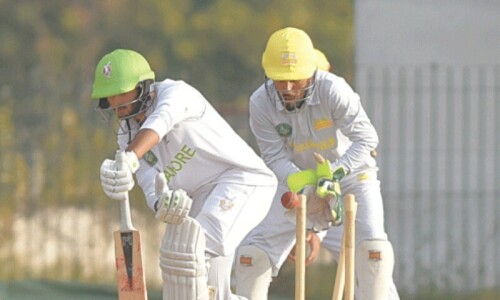
“How can you not be inspired when you are walking every single day of your early life in the shadow of the greatest mountains on planet earth, be it Rakaposhi or Nanga Parbat?” says Nazir Sabir.
Sitting in a crowded lobby of a local hotel, it might seem hard to distinguish Sabir from average middle aged Pakistani men but what sets him apart from others is his resolve for climbing and the laurels he brought to the country in the niche sport of mountaineering.
From sharing camaraderie and climbing with one of the greatest climbers in the world, Reinhold Messner, to scaling the Everest, the path Sabir chose not only defied convention, but also proved to be an inspiration to many all over the world.
Born in a small hamlet called Ramanji in Chiporsun, upper Hunza, Sabir says he was fascinated by the stories about the ‘big mountains’ which porters from that area shared.
“Under the shade of the trees we heard stories from the porters who went with foreign expeditions, of the harsh and difficult terrain and how true grit lead to triumph. I must have been in class IV then when an expedition came to our village and that was my first interaction with mountaineers who went around in climbing boots handing out sweets and little knick knacks to us children.”
“And that was also my first attempt at speaking English,” he added after a slight pause.
“In high school, we read the story ‘First ascent of Everest’ and that really put some ideas in my head,” said Sabir.
Studying in college and working as a guide in Gilgit, in 1973, Sabir assisted a Japanese expedition aiming for Passu Peak. “The Japanese team hired me as a local guide. They were the ones who taught me the basics, including tying the knots, using crampons, etc. That was my first experience, something more than just rock climbing, and it got me addicted. I went to base camps with them but wanted to do more.”
It was during his wandering years that he came across Italian mountaineer and explorer Reinhold Messner in Gilgit. A whimsical yet hard as nails climber, Messner proved to be Sabir’s lucky charm. “Messner was trying to sell his boots and climbing equipment in Gilgit and I went around helping him. I was surprised and equally happy when he invited me for his 1975 expedition to Gasherbrum I (also known as Hidden Peak). Maybe he saw my craziness, not that it wasn’t hidden from everyone.”
But Sabir was unable to be a part of that team which went on to achieve a feat that was considered impossible.
“I am still shocked as to how Messner and Austrian climber Peter Habeler attempted the most daring climb in the history of mountaineering.” Messner and Habeler went to climb Gasherbrum I (8,080m) with no oxygen, thus accomplishing a summit in true Alpine style.
After a failed attempt at K2 in 1977, Sabir once again returned to the ‘Savage Mountain’ in 1981, suffering a personal tragedy.
In 1980, his elder brother, Inayat Shah, died in an avalanche at Diran (also known as Minapin Peak). “It was the biggest loss in my life. I had so many climbs planned with my brother who was in the SSG. To me, that remains to be the darkest side of mountaineering.”
During this tough period, he was invited to be a part of the Waseda University Expedition that aimed for K2. “I lied to my mother about this attempt as I did not want to hurt her. All I told my family was that I was assisting the group at the base camp and that was it. The last thing I wanted to do was hurt my mother.
After a gruelling push, Sabir reached the summit of the highest mountain in Pakistan on August 7, 1981.
“Rather than going from the usual Abruzzi ridge, we went from the West/South West Ridge for the first time. It was a big personal achievement for me as I became the second Pakistani to climb K2. However, after that my family stopped believing me and it took them a while to really trust me again.”
Following his success at K2, he finally teamed up with Messner in 1982, along with Sher Khan, another Pakistani mountaineer.
“It was an experience in itself as we attempted Broad Peak and Gasherbrum II in a week in Alpine style. At that point, it was the fastest ever ascent of two peaks.”
For his athletic accomplishments, Sabir was awarded the Pride of Performance award in 1982.
In between all this came Hollywood calling. Long before any of the Pakistanis landed a film role in an American movie, Sabir ended up playing the role of a Balti liaison officer in K2, an adventure film along with a number of other mountaineers from Pakistan including Rajab Shah and Shah Jahan. However, he still cringes when someone mentions it. “The movie trivialises mountaineering.” Yet another pet peeve remains to be the hugely popular yet grossly inaccurate ‘Vertical Limit’. “They just cannot capture the spirit of mountaineering.”
Years passed by as Sabir carried on with climbing mountains. In 1997, the golden jubilee year of Pakistan, he went to climb the Everest. “Due to bad weather and strong blizzard, we returned after two attempts.” Back home he had to face some serious media hounding.
“At a press conference in Islamabad, a reporter went on to the extent of saying “aap nay mulk ki izzat dao pe laga de, aap Everest nahi sar kar sakay” (You put the country’s honour at stake, you could not scale the Everest). The ease with which he said that was truly remarkable as I am sure he had no idea about climbing, and I wonder if he ever climbed the nearby Margalla Hills.”
But not the one to give up, he eventually ended up on Everest on May 17, 2001. “Everest is Everest. It was the biggest psychological challenge for me. I still cannot describe the feeling I had when I scaled Mount Everest. I thanked God and after hoisting the Pak flag, I remembered my friends who died at the Everest.”
Receiving a hero’s welcome, Sabir recalled, “When I climbed K2, all I got was a paragraph or two in some publications. But climbing Everest was big news and I saw my pictures all over on the front page. When I landed in Pakistan, thousands of people came to greet me at the airport. For six months at least I was in the news!” The same year he was awarded Sitara-i-Imtiaz for his contribution to mountaineering.
All these years, along with climbing Sabir also firmly focused on some issues close to his heart. After a stint in local politics, with him defeating the Mir of Hunza in the 1994 elections with a huge margin, he also became active at the community level.
Although not an eco-warrior screaming ‘go green’ at the drop of the hat, Sabir is an active campaigner for keeping our glaciers clean. He is one of the rare civilians who have raised his voice against pollution at Siachen glacier.
As the president of Alpine Club of Pakistan, he did his bit to encourage women mountaineering in the country and arranged for the biggest training camp that allowed some twenty young women from all over Pakistan to participate.
Talking about climbing all the 8,000m peaks, which is the ultimate goal for many a climber after it was first accomplished by none other than the mighty Messner, Sabir says, “If I wanted to do something like that I would have done so. For me climbing is more than just setting records. It’s a spiritual experience. I do want to climb but it will only be when I feel like I am ready for an adventure.”













































